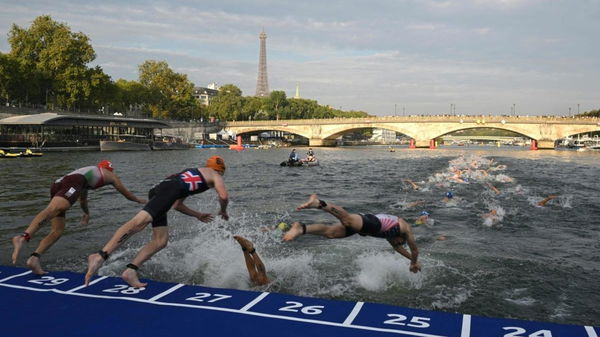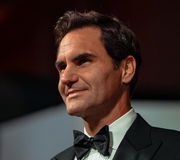
Imago
The mayor of Paris Anne Hidalgo (C) poses with swimmers during the inauguration of the Bras Marie nautical base in Paris on July 9, 2023, as she announces the river Seine’s bathing sites planned for Parisians in 2025, as a legacy of the Olympic and Paralympic Games. (Photo by Bertrand GUAY / AFP)

Imago
The mayor of Paris Anne Hidalgo (C) poses with swimmers during the inauguration of the Bras Marie nautical base in Paris on July 9, 2023, as she announces the river Seine’s bathing sites planned for Parisians in 2025, as a legacy of the Olympic and Paralympic Games. (Photo by Bertrand GUAY / AFP)
Did you know? Since 1923, due to health-related issues swimming in the river Seine was prohibited. Afterward, Olympic organizers made efforts to clean the river and bring it up to the mark for safety and cleanliness. But, even with investing $1.5 billion, the river Seine lacks the hope of whether its’ actually safe or not for the 2024 Paris Olympics. Though worries are quite genuine, there is a perceptible excitement for the Olympics in Paris. With only nine days remaining, concerns have been raised over the cleanliness of the Seine River, which will host multiple Olympic sports.
Watch What’s Trending Now!
Anne Hidalgo, the mayor of Paris, swam in the Seine on Wednesday, showing its safety. This was a daring move to eliminate doubts about the quality of the river’s water. Has it, however, allayed the worries of Parisians and the global community? Hidalgo wanted to reassure people that the Seine is clean enough for the Games, with her diving knee deep into the water. Hidalgo remarked after the swim, “It’s very, very cool to be here, and it was a dream and now it’s real.” On the other hand, official testing has revealed increased E. Coli levels between June 3 and July 2, which poses a major health risk to athletes.
Despite the city spending €1.4 billion to clean the river, recent rainfall has raised the E. Coli levels to 2000 CFU/100mL, which is twice the World Triathlon standard. There has been an awareness of this change in the water’s quality. On X, “Karata” reflected general skepticism by asking, “Would you take a swim in the Seine?” Furthermore, Olympic events have previously been endangered by poor water quality. Similar problems with Guanabara Bay, where pollution and superbugs affected sailing events, plaguing the Rio 2016 Olympics. Athletes and fans expressed concerns about potential health hazards as Rio’s predicament garnered international notice.
ADVERTISEMENT
She did it!
Paris Mayor Anne Hidalgo swims in the Seine River this Wednesday 17 July, just 9 days before the Olympic Games.
She wants to prove that the river is clean and ready for the 2024 Olympics.
Would you take a swim in the Seine ?#paris2024.pic.twitter.com/NIMdqmyU9H
— Karata (@karatademada) July 17, 2024
Now, for the 2024 Paris Olympics, the Seine River’s safety is nevertheless a sensitive topic despite the mayor’s promises. Along with Hidalgo, Amelie Oudea-Castera, the French Minister of Sports, showed confidence by swimming in the Seine last week. However, the water quality in Paris falls short of expectations. This occurrence highlights the ongoing uncertainties and views from fans.
ADVERTISEMENT
Fans’ ‘clean’ views of the Seine River’s conditions ahead of the Paris Olympics
There is a mixture of optimism and cynicism surrounding the Paris Olympics, especially about the planned swimming events on the Seine River. Many spectators have grave concerns about the water’s hygiene and safety, even though some are looking forward to the show. A user’s dramatic message perfectly captures the worries regarding the quality of the water: “Seems she’d book an appointment with a dermatologist after this, cos wtf is this? No! No!! No!!! I wouldn’t swim here 🤮.” Emphasizing the risks that go beyond the competition, a different fan said: “Forget about gold medals…the real challenge will be dodging the floating debris and holding your breath for the entire swim👀” It highlights the real-world challenges that athletes may encounter, casting a shadow on their success in sports.
ADVERTISEMENT

The organizing committee president for Paris 2024, Tony Estanguet, voiced faith in the progress of the preparations. Estanguet noted the city’s attempts to adhere to safety regulations, saying, “Today we have confirmation that the Seine is swimmable.” He agreed that backup preparations were necessary, particularly in case of severe rains that might raise pollution levels. The expensive outlay for Seine cleanup has not gone ignored: “Paris mayor finally gets to swim 🏊 in the Seine River. It cost €1.4bn.” This caustic comment betrays doubts about the effectiveness and rationale of the substantial expense.
ADVERTISEMENT
Doubt is also increased by visual perceptions of the water: “I wouldn’t swim if I can’t see what’s underneath the water 😅” and “I don’t see the water as that clean though! It shows in the video, it is greenish 😁.” These remarks imply that one cannot be confident in the water’s safety for swimming given its apparent cleanliness. Rio’s past experiences have demonstrated that hurried promises are ineffective in easing ingrained anxieties. The predicament in the Seine is similar to that in Rio, where problems with the quality of the water drew attention from around the world and prompted demands for improved infrastructure and sanitation.
Top Stories
Greg Biffle’s $4M Worth Prized Possession Still Without a Buyer Leaves NASCAR Fans Heartbroken

LIV Golf Braces for Another Possible Exit in Wake of Brooks Koepka Departure

Sean Payton Announces Retirement Plans as Broncos HC Demands Improvement From Bo Nix & Co. Before Playoffs

Biff Poggi All But Confirms Bryce Underwood’s Michigan Future After Announcing His Own Departure

Roger Federer Draws Criticism from Swiss Government Chief for Tourism Boom in Country

Amanda Balionis Confirms New Relationship Ending Months of Rumors

A fan sarcastically suggests taking medical precautions, stressing the importance of health concerns: “Shortly followed by lots of antibiotics 💊💊💊💊💊.” This opinion is summed up in one very direct comment: “All Politicians are the same, it’s a publicity stunt.” This shows a lack of faith in the intentions of public leaders, implying that the work and money spent may be more focused on projecting a favorable image than on guaranteeing the security and usefulness of athletes.
Thus, this brings to light worries about possible illnesses from river swimming. With the July 26 Opening Ceremony scheduled to take place on the Seine, all eyes will be on Paris to ensure a successful and secure event. The viability of the Games will be largely dependent on the city’s capacity to control the purity of the water. Thus, there is a ray of optimism because sunshine and elevated conditions have improved the quality of the water. Paris has to make sure that every precaution is taken in the next few days to keep the water quality within acceptable limits. The world observes as Paris works to turn the Seine from a contentious emblem to one of victory.
ADVERTISEMENT
ADVERTISEMENT
ADVERTISEMENT
ADVERTISEMENT

